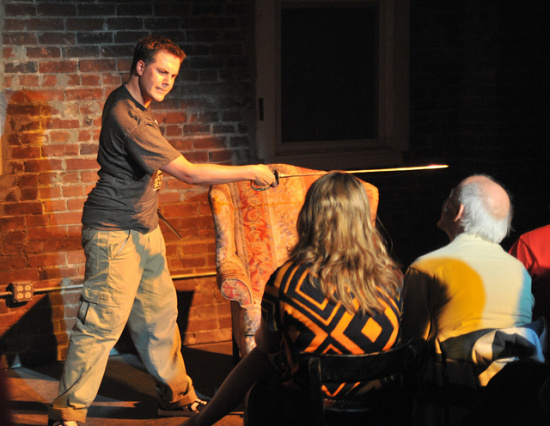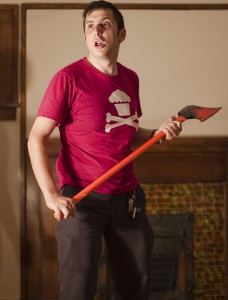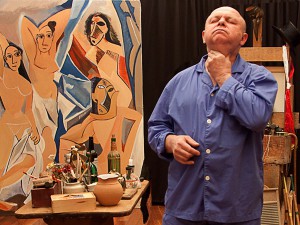|
JACQUELINE LAWTON: Why did you decide to get into theatre? Was there someone or a particular show that inspired you?
SOPHIA BUSHONG: I got into theater to be an actress. I was inspired by TV when I was 5 or 6. I saw John Hillerman, who I recognized from Magnum P.I., play an historical figure on some television movie. At first I was confused, so my mother explained what actors do. I was hooked from that moment forward. My family lived in a small town in Colorado, so we didn't attend theater very often. I do remember the first play, of sorts, that I saw. It was a performance about Neanderthals put on at the science museum. I pursued acting from that point on- spending many years working in New York and regional theaters- until about two years ago, when I turned my attention towards writing. JL: How long have you lived and worked as a theatre critic in D.C.? What brought you here? Why have you stayed? SB: I don't consider myself a critic. I've written reviews for the City Paper Fringe and Purge blog during the Capital Fringe Festival. I began contributing to the Arts Desk blog about 16 months ago, writing about new play development and process. I got involved with Fringe and Purge shortly after moving to DC three years ago, because I wanted to get acquainted with the theater scene here, as well as practice the discipline of writing. Being both a writer and an actress was always a challenge for me. I would start creative writing pieces then set them aside for months at a time when I got cast in a play. As you might imagine, my stories have not been well served by my working in this manner. I review very rarely for City Paper outside of Fringe and Purge. I'll do it only when there are a lot of shows opening in a single weekend and they need all hands on deck, so to speak. I have been cautioned against trying to be both a critic and an actress in this market. I understand why, though it saddens me a little. I have been cautioned by people who have my best interests at heart. I'm not willing to make a choice that will prevent me from returning to acting. I did both in New York, but New York is such a huge town. As long as you don't get famous for either pastime, nobody cares. The city just absorbs it all. JL: How do you define the work you do? Specifically, what is the role of the theatre critic in the world of theatre? What contribution do you hope to make in the D.C. Theatre community and the American Theatre? SB: A great critic can be a catalyst for thoughtful, honest public discussion. They can be an observer of artists conversing with one another, through their art, across borders and generations. By articulating what they see, hear, and feel at a performance they can expand the awareness of young or less experienced audiences. JL: If your work as a theatre critic doesn’t pay the bills, what else do you do? How do you balance this work with your play viewing and criticism? SB: I've never paid all my bills with my creative work. I was just successful enough to have a complicated tax return. As I mentioned, balancing my different creative passions and devoting enough time to each is a constant struggle. I would not say I have achieved a satisfying balance at all. JL: What skills and traits do you feel a successful theatre critic should have when writing about theatre, especially when it comes to new plays? SB: I try to view a new play with an open mind. I try to identify what the playwright and the creative team want to share with the audience and whether they have done so with clarity and insight into the human condition. If I had to pick one trait that a critic should have, or one that I look for when choosing whom to read, I'd say a lack of snobbery. I don't think someone with a narrow definition of what is "good" or "bad" art can be of much service to a diverse community of readers and theater- goers. JL: What is your writing and viewing process? Do you read the script prior to seeing a production? Do you research the author and/or world of the play? Do you read the program notes? SB: I do all of those things. Offering historical and artistic context is very important. I always write as if my reader is reading their first review, or their first piece about the process of creating theater. As if it's the first time they are learning about a particular play or playwright. Perhaps they are thinking about buying a ticket for the first time. JL: In the article, “Ohio Critic's Tough Words Elicit Rough Reaction,” Denver Post Theater Critic John Moore states: “There is no universal rule book for criticism, no how-to manual. My guidelines: Be true to your visceral emotional response, good or bad. State your case and back it up. Be a catalyst for discussion. Encourage dialogue. Don't be personal. Never try to be funny at the expense of someone's feelings.” What guidelines, rules or standards do you have for your own work? Have you always upheld them? If so, at what cost? If not, what shifted the line for you? SB: I agree with all of that- that's a great set of guidelines. I think about which "cap" I have on. I have spent most of my life as a theater- maker rather than a critic, so I think consciously about the fact that my readers are the audience to whom I have a responsibility, not the artists behind the play. That said, I do try to see what was good in a production, what worked well, where there is talent to encourage, even if the show overall isn't successful. Because I have been on both sides of this equation, giving and receiving, both positive and negative critiques, I can comment on John's last point in particular. In general I wish the actor/ critic relationship was better understood on all sides. Actors often see the critic as an enemy. I have met and worked with a number of theater critics now. I don't find them to be negative or spiteful people. I believe most are doing this because they love theater. Writing reviews is challenging, time- consuming work that usually doesn't pay well and often makes people hate you. I wish actors would remember that there is little incentive to be a critic for someone who doesn't want the best for theater. JL: What is the greatest part of being a theatre critic? What has been your most difficult challenge? SB: Personally, I love seeing, writing, and thinking about theater. I always go in hoping to see something great. Something I get to tell everyone is well worth an investment of time, energy, and money. That said, getting a negative review hurts and is humiliating. It's that simple. A critic has power that they should wield responsibly, while being honest with their readers. I also believe that if the goal of artists and critics alike is to be of service to Theater, to encourage the creation of great theater, that getting personal in a review defeats that goal. During one Fringe festival, I reviewed a show that was terrible. It was offensive, horribly written and performed, and I was angry when I left the theater. However, in my review I tried to be honest but thoughtful and bear in mind that the artists intended to make something good. Another publication lambasted the show and everyone involved. An online argument ensued. That critic wrote, I have to be honest, the review I was tempted to write. A review much like one I did write but didn't turn in. But watching the online argument taught me something. Getting personal in a critique makes artists defensive, dismissive of a critic's valid and insightful points, and more likely to continue making bad theater. As an actor I've learned a bit about recovering from a bad review. I got a bad review from one of the critics likely to be contributing to this blog series, in fact. I was hurt when I read it and took some time to lick my wound. I recall that the word used to describe my interpretation was "shallow." (And no, I'm not going to re- read it now to check.) However, because she didn't make it a personal attack, I had to step back and ask myself, "Is she right?" I believe to some extent yes, and to some extent no. Part of the playwright's intention was to reject the shallow values my character represented. However, I did find passages where I was able to make my character's arguments clearer. She felt betrayed by those around her I tried to bring more of that out after absorbing the critique. Her negative review improved my performance. As an actor, you always have the opportunity of the next performance. Reviews come out at the beginning of a run. Once a review is published the critic is done, though they may have new and more interesting thoughts about the show for a long time after. The actor gets to keep working, keep improving the quality of the work. There's power in that. JL: Who are your favorite playwrights? What is it about their work that inspires or draws you to them? SB: Shakespeare, Ibsen, Schiller, Williams, Hellman, Zimmerman. Poetry in dialogue draws me. I find people to be very poetic, innately, even when the poem is horrifying or vulgar. Humor. Continued relevance. I'm not sure how to put this- a great play can withstand the rigors of reinterpretation by many and diverse artists. For actors, all your questions can be answered within the text. The human condition you must portray is there in the words for you to discover. Artists bring their ideas to the rehearsal hall, but a great play is always the strongest "personality" in the room. JL: DC artistic directors are… SB: Progressive, ambitious. JL: DC actors, designers and directors are ... SB: Fortunate to be working in a supportive community, hard- working, innovative. JL: DC playwrights are … SB: Prolific, talented. JL: DC audiences are ... SB: Intelligent, enthusiastic. All are extremely culturally and politically conscious. The intelligence and political savvy I see in the audiences permeates the work being made here in a wonderful way. JL: How do you feel the DC theatre community has addressed the issues of race and gender parity? How has this particular issue impacted you and your work? SB: I see this community doing everything it can to make audiences aware of the lack of gender and racial parity in theater. I see many companies working to improve those stats in their own houses, through outreach and choice of material. I've had the opportunity to write about these efforts a few times, which is always satisfying. JL: What advice do you have for an up and coming DC based theatre critic who has just moved to the area? SB: If I ever feel that I've achieved better balance personally, maybe I'll offer advice. I have learned a thing or two that helps me both as a critic and an actress: Be of service to the play and your audience, spend no energy quantifying what benefits you might get, or did get, out of the experience. Trust your instincts. Keep going.
0 Comments
Your comment will be posted after it is approved.
Leave a Reply. |
My BlogI'm a playwright, dramaturg, and teaching artist. It is here where you'll find my queries and musings on life, theater and the world. My posts advocate for diversity, inclusion, and equity in the American Theatre and updates on my own work. Please enjoy!
Categories
All
Archives
June 2020
Reading List
|



